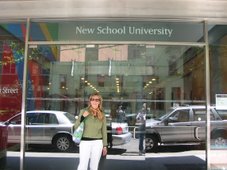Dear Friends,
Here is a link to www.thecriticalreader.com an awesome article about multiple choice critical reading questions on the SAT.
Most of you make these mistakes. Being aware of them beforehand will help you avoid the pitfalls.
Check them out; know them; be a strong SAT standardized test taker.
http://www.thecriticalreader.com/if-you-keep-getting-down-to-two-critical-reading-answers-and-always-pick-the-wrong-one/
YOUR COLLEGE CONNECTION
Discussion of the college admissions process with Brenda of BrenMar Associates, an educational, college admissions and financial aid planning consultant. brenda@brenmar.net, 207-878-2500, www.brenmar.net Follow us on twitter@brendabreton or facebook - www.facebook.com/www.brenmar.net
Wednesday, March 11, 2015
Thursday, January 15, 2015
Posted:
Updated:
Ignoring schools you never heard of.
If you limit your search to the same 200 schools where everyone else is also applying, you are shortchanging your student, said O'Shaughnessy. One of the realities is that when so many people apply to the same places, those schools become highly selective in who they pick and far less generous with financial aid. O'Shaughnessy suggests adding some smaller, lesser-known schools to the list. Colleges That Change Lives , a consortium of smaller liberal arts schools, is a good place to start, she said.
Smaller colleges also provide a more intimate learning experience, she said. Students get to know their professors, can find role models and mentors to help shape their future, and in general, don't get lost in the masses. You are more than just one of the bodies warming a seat in a big lecture hall taught by a TA who never really wanted to be a teacher in the first place, she said. "Even dance classes at big universities are taught 'lecture style'," she said.
But don't those big brand-name schools mean a happier college experience and a higher jobs placement rate after graduation? Au contraire, O'Shaughnessy said. It turns out that your future happiness at work and at home has more to do with what you do at college than where you went to school, according to a recent poll by Gallup and Purdue University. College is what you make of it, O'Shaughnessy, whose own daughter when to a school you likely never heard of and can't spell and propelled herself into semesters abroad, launched a business while an undergraduate, and is now the head of marketing for a toy company.
Not knowing what you can actually afford ahead of time.
Amazingly, she said, many parents get sucked into this quicksand trap. Their kids start the college application season without knowing how much money they have to spend. This is the educational equivalent of looking at $2 million homes at open houses when you can realistically afford to buy a $300,000 condo. And we all know what happens after we do that: Those $300,000 condos just look so darn uninviting afterward.
Why let your student apply to schools that you can't afford? asks O'Shaughnessy. Affordability is a conversation to have with your kids before they apply, not after they get accepted to a "dream" school and have no viable means to pay for it.
O'Shaunghnessy says everyone should run their numbers through the Expected Family Contribution calculator to learn what colleges and universities are likely going to say about what your contribution should be.
To get your Expected Family Contribution (EFC) number, you can use the EFC calculator on the College Board site.
"You need to obtain your EFC to get an idea of what any college will cost you at a minimum," said O'Shaughnessy. But, she notes, usually you will have to pay more than that. When you know what your EFC is, you start looking for schools that would be a reasonably good match financially.
If you have a lower EFC (you are low/middle income), look for schools that are very generous with financial aid. If you have a high EFC (you are wealthy) and don't want to pay full price, look for schools that give merit scholarships to rich kids.
Then there is the Net Price Calculator, which provides a personal estimate of what a particular school will cost your family. Here's where it can get a little dicey: About half of the schools' calculators are bad because they used the federal template that doesn't ask enough questions.
Counting on your brilliant student to get a full merit scholarship ride.
Yes, Abe Lincoln rose from poverty and became President. Sure it can happen, but it's hardly the norm. If one of the pillars of your college planning includes having a miracle occur -- which would be the definition of a full-ride merit scholarship -- chances are your student is going to be disappointed. Here's the reality: The kids who get the full ride with merit scholarships are a tiny minority; they are generally kids with great potential and no money. Everybody else? Get your checkbooks out.
O'Shaughnessy tells the story of a two parents -- both doctors -- with a daughter with a 4.7 GPA bolstered by about a dozen AP classes, nearly perfect test scores and major notable extra-curricular accomplishments. She was admitted to the top schools in the country -- and not one offered a penny in merit scholarships. Her mother bemoaned how unfair it was that a "less meritorious" student whose parents hadn't scrimped and saved the way her own family had would get financial aid and her daughter would not. Foul, she cried.
O'Shaughnessy says that elite schools receive an overabundance of high-income applicants so they can turn away teenagers whose parents balk at paying full price. "These schools do tend to provide excellent financial aid to students who need it, but these institutions are largely dedicated to educating the nation’s most privileged teenagers." Another reason to maybe steer away from those schools?
Believing that your student-athlete will win a scholarship.
This is a dream you share with every other soccer, basketball, baseball, tennis, cross country and football parent. Many are called; few are chosen. Only Divisions I and II schools offer athletic scholarships; Division III teams do not.
Division I students are essentially employees of the school and the best chance for a full-ride athletic scholarship is to compete in one of Division I's six head-count sports -- which your student will either get a full-ride or nothing. For men's basketball, there are a grand total of 13 scholarships. How's that for sobering?
In other sports, known as equivalency sports, there are lower scholarship amounts available; some of these could only cover books.
Excluding the glamour sports of football and basketball, the average NCAA athletic scholarship is about $8,700 -- nowhere near a full ride. For track or baseball, it's generally about $2,000. College expenses at NCAA schools range from $20,000 to $50,000 a year. So the idea that your left-handed relief pitcher can write his own ticket to any school is pretty much a myth.
As for scholarships in general, thinking local tends to yield more money. Better to try your local civic organizations where there is less competition for money. Remember, it takes a village.
Believing that student loans will be your salvation.
Student loans are the work of the devil, believes Zac Bissonnette, author of "Debt-Free U: How I Paid for an Outstanding College Education Without Loans, Scholarships, or Mooching off My Parents."
Bissonnette says "Student loans are one of the top three things teenagers can do to ruin their lives. The others are heroin and pregnancy." O'Shaughnessy thinks that parents who go into massive debt -- or allow their children to -- are misguided at best.
College -- and retirement -- are things that require planning. You don't just arrive at the doorstep of college penniless and think it's all going to work out "somehow." And should you be among those who do precisely that, maybe consider a gap year where your student works and saves some money. Community colleges, where you can take your general ed classes and then transfer to a four-year school for an advanced degree, is another option. But loans? You need to really consider what you are getting yourself into -- years of debt that will strap you and hinder your ability to live on what you can earn once you get that expensive college degree.
Worrying that your home equity matters.
Many people are house-rich and cash-poor, meaning they have their life savings tied up in the equity of their homes and would rather not sell their house in order to get at the money to pay for college.
The good news is that at most state and private colleges and universities, the equity in your primary home is a non-issue, said O'Shaughnessy. That’s because most schools only require families to complete the FAFSA (Free Application for Federal Student Aid) when applying for financial aid and the FAFSA doesn’t even ask about home equity. What you just heard was a collective sigh of relief coming from California and other states where home prices have long been inflated and there are many "paper millionaires."
There are, however, roughly 260 schools, nearly all private, that are quite interested in the value of your house and how these schools treat home equity varies dramatically, O'Shaughnessy said. The schools in this category include the nation’s most prestigious institutions. These colleges use an additional financial aid form called the CSS/Financial Aid PROFILE.
Depending on how schools treat your home equity, your chances of getting financial aid could blow up while at other institutions your money in your house won't be jeopardized even if you are living in an exclusive zip code, notes O'Shaughnessy.
One big drag, she said, is that while you can technically appeal any financial aid decision, you are at a disadvantage time-wise -- you only get a couple of weeks to let the college know if you accept its offer -- and you don't actually know what the school considered when factoring what aid to give you. So did they count your home equity or not?
Not knowing how to evaluate an offer.
O'Shaughnessy says financial aid offers are intentionally designed to confuse families. The one thing parents really want to know is "what is my EFC (Expected Family Contribution?") And sometimes, that answer is convoluted. Does it include room and board, all fees, or just tuition?
Sometimes, schools don't identify loans as loans but insist on calling it "financial aid." O'Shaughnessy recommends the website College Abacus to compare offers.
Thinking Community College is a great fallback.
For some, it may be. But let's take a reality check on community colleges. They are inexpensive and allow students to go to school part time and work. The problem is that overwhelmingly when they do that, they don't finish. Many are eligible for Pell Grants -- which would give them the money they need to live while they study -- but don't apply. Yes, some motivated kids who do graduate two-year schools do go on to four-year universities -- but many more never get to that stage. Placement tests are required at four-year schools and students don't know they need to prepare --practice -- for those tests, said O'Shaughnessy.
If your student wasn't motivated in high school to get good grades, why do you think he or she will be motivated in junior college to get the grades for a four-year college?
Tuesday, January 6, 2015
Hello Friends,
Selling yourself is crucial throughout the college application season and as you move into your chosen careers. As we enter 2015, this is the time to set goals about our college search and learn how to communicate our strengths.
Having self-awareness about your strengths and knowing which ones you want to showcase will be the winning ingredient during your college search.
Let's start with this one:
What is a good learner? How do colleges look at a student's strengths?
When we look at the strengths of good students, we are really looking at the qualities they possess that sets them aside from the rest. The only thing different about them - in most cases - is their ability to learn more effectively.
The following are just some of the qualities of good learners.
A good learner must have a passion for knowledge. It is an innate energy or drive. Curiosity.
A good learner usually will have or seek to increase good critical thinking skills. It's the ability to take everything under consideration when thinking critically.
A good learner remains focused on the subject matter at hand, and takes time to review the material until it is clear.
A good learner also knows when it is a good time or bad time to study and understands times that are easiest to focus.
A good learner perseveres and moves beyond the frustration when items are not easily understood at first.
A good learner will realize that in many instances, learning is not a spontaneous event, but something that is gained slowly over a period of time.
A good learner understands the importance of practice, practice, practice.
So let's spend some time assessing your strengths and the best ways to communicate those strengths.
If we haven't met to discuss your courses for next year, college courses during the summer, summer jobs, internships, SAT assessment, college trips, and other strength revealing opportunities, please drop me a note.
Wednesday, June 18, 2014
EFFORT = SUCCESS
Hello Friends,
My first peony of the season. Growing peonies has been very difficult for me. I have had to work the soil repeatedly with little success, but the last two years the results have been fabulous.
What did I learn? You know.
Have a plan, assess the results from that plan, make it repeatable and then maximize it.
That sounds like a strategy that could work for most challenges in life.
Give it a try and let me know your results.
Best,
Brenda
My first peony of the season. Growing peonies has been very difficult for me. I have had to work the soil repeatedly with little success, but the last two years the results have been fabulous.
What did I learn? You know.
Have a plan, assess the results from that plan, make it repeatable and then maximize it.
That sounds like a strategy that could work for most challenges in life.
Give it a try and let me know your results.
Best,
Brenda
Subscribe to:
Posts (Atom)
UNIVERSITY OF NORTH FLORIDA IN JACKSONVILLE

THIS ONE IS A HIDDEN GEM! NEAR A CITY AND THE BEACH
ABOUT US.

- Brenda Breton
- We are what we manifest. Trying to be my true, authentic self as I help others become who they are meant to be.
UNB SAINT JOHN COLLEGE

TRAVEL BETWEEN BUILDINGS UNDERGROUND IN THE WINTER
Connecticut College Visit

Your College Connection Visits the CC Connection
New School University in NYC

Visual and performaning arts majors would have a fabulous experience here at the New School.
New York University

We had a difficult visit at NYU. Although a tour was passing through the library, we were not allowed to enter. We must have looked investigative.
Fordham University in the Spring.

The campus security was stellar!
KEENE STATE IN NEW HAMPSHIRE

We loved the campus despite Marcel not being allowed in the union.
Iona College

We loved this campus and the little village. The student union was superb and the students appeared less stressed. The student working in the bookstore was especially eager to share her positive experiences at the college.


